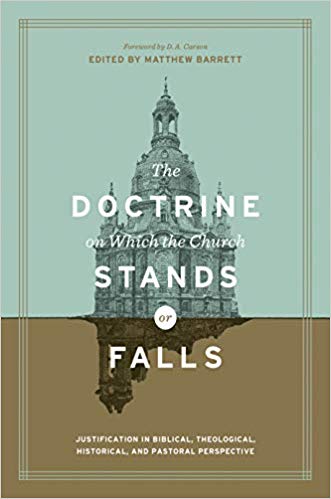A Brief Book Summary from Books at a Glance
By Mark Baker
About the Editor
Matthew Barrett is associate professor of Christian Theology at Midwestern Baptist Theological Seminary. He also serves as founder and executive editor of Credo Magazine. He has authored several books including None Greater: The Undomesticated Attributes of God and God’s Word Alone: The Authority of Scripture.
Overview of the Book
Johann Heinrich Alsted famously argued that the doctrine of justification by faith alone was the doctrine on which the church stands or falls. This book seeks to provide a comprehensive treatment of this crucial doctrine by providing 26 essays from the disciplines of biblical studies, theology, church history, and pastoral practice.
Table of Contents
PART 3: JUSTIFICATION IN CHURCH HISTORY
18: Reformation Invention or Historic Orthodoxy?: Justification in the Fathers
Gerald Bray
19: The Evolution of Justification: Justification in the Medieval Traditions
Nick Needham
20: Can This Bird Fly? The Reformation as Reaction to the Via Moderna’s Covenantal, Voluntarist Justification Theory
Matthew Barrett
21: The First and Chief Article: Luther’s Discovery of Sola Fide and Its Controversial Reception in Lutheranism
Korey Maas
22: The Ground of Religion: Justification according to the Reformed Tradition
J. V. Fesko
23: Not by Faith Alone? An Analysis of the Roman Catholic Doctrine of Justification from Trent to the Joint Declaration
Leonardo De Chirico
24: The Eclipse of Justification: Justification during the Enlightenment and Post-Enlightenment Eras
Bruce P. Baugus
PART 4: JUSTIFICATION IN PASTORAL PRACTICE
25: Justification and Conversion: Attractions and Repulsions to Rome
Chris Castaldo
26: The Ground on Which We Stand: The Necessity of Justification for Pastoral Ministry
Sam Storms
Summary
Chapter 18: Reformation Invention or Historic Orthodoxy? Justification in the Fathers
Gerald Bray
Many people think that the pure gospel was quickly lost after the writing of the New Testament and was only rediscovered by Luther and his fellow Reformers. But is that sentiment actually true? Careful examination of the church fathers shows that they were much more in line with the Reformers than we often think. For example, Tertullian, in an essay called On Repentance, speaks of the importance of good works only as a sign that God is working in a believer, not as a way to merit salvation (573). Though later Roman Catholic scholars used Origen to support their views of a more works-based salvation, a true investigation of Origen’s works reveals that the true error rested in the interpretation of medieval interpreters of Origen, not in Origen himself (577–78).
[To continue reading this summary, please see below....]The remainder of this article is premium content. Become a member to continue reading.
Already have an account? Sign In
